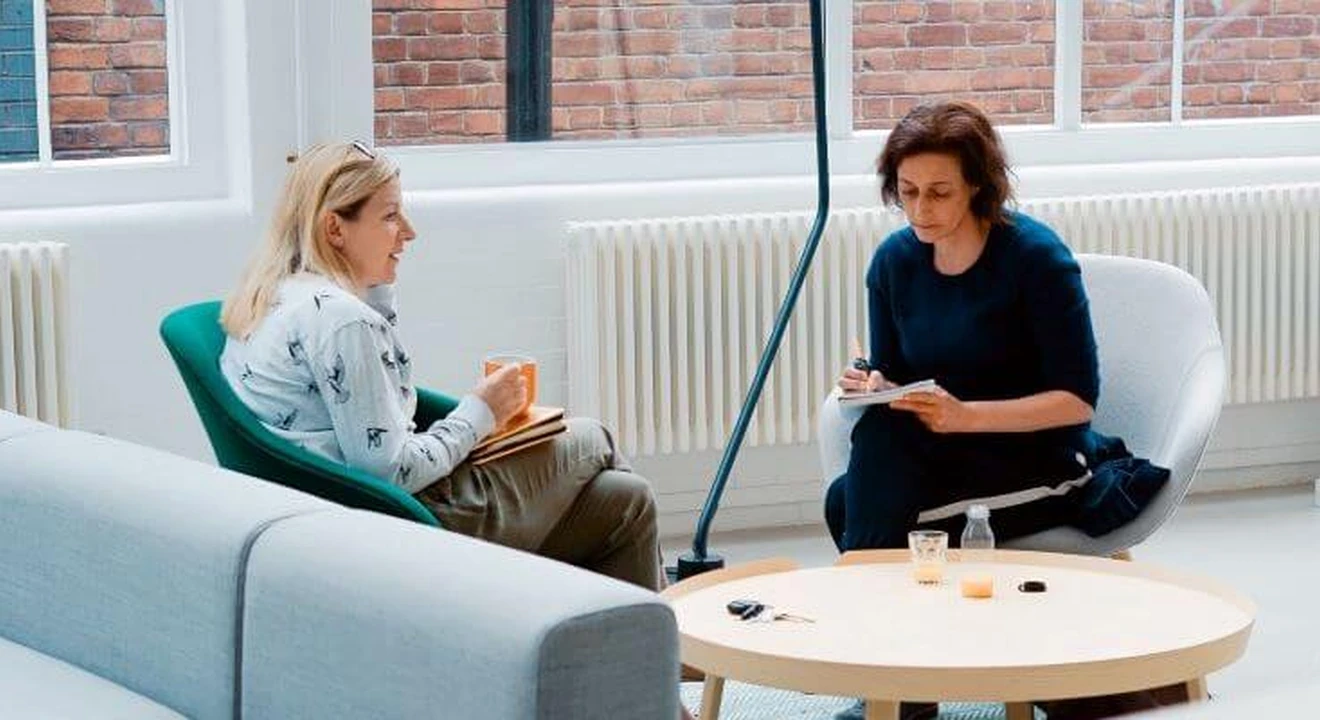Many candidates think that if they are comfortable cracking regular case interviews they should also be able to succeed at written cases. But unfortunately, over the past few years we have worked with many candidates and noticed that this wasn't necessarily the case.
BCG and Bain written cases include 20+ pages of documents which you need to analyse to answer a few client questions. In addition, you need to summarise your answer to the case on 3 to 5 slides and present them to your interviewer.
The written case format therefore requires you to quickly find key pieces of information that are burried in pages of unimportant content. And to craft and deliver a high quality presentation and slides. These two skills are not tested by regular case interviews and mastering them requires some training.
Most candidates overlook this fact. As a consequence, if you prepare specifically for written case interviews you will have a significant advantage over other candidates. This guide summarises everything you need to know to get from "What's a written case interview?" to "I'm confident I can crack written cases and get an offer at BCG and Bain."
Click here to practise 1-on-1 with MBB ex-interviewers
Part 1: Written cases: BCG vs. Bain
The first step to succeed in written case interviews is to understand why both BCG and Bain use them in their 2nd round. And to also get familiar with the characteristics of the written case format used by each firm.
1.1 Why do BCG and Bain use written cases?
In your daily life as a consultant, you will have to deal with a lot of data and transform it into insightful presentations to answer your clients' questions. BCG and Bain both use written cases in their 2nd round interviews to make sure you've got those skills before giving you an offer.
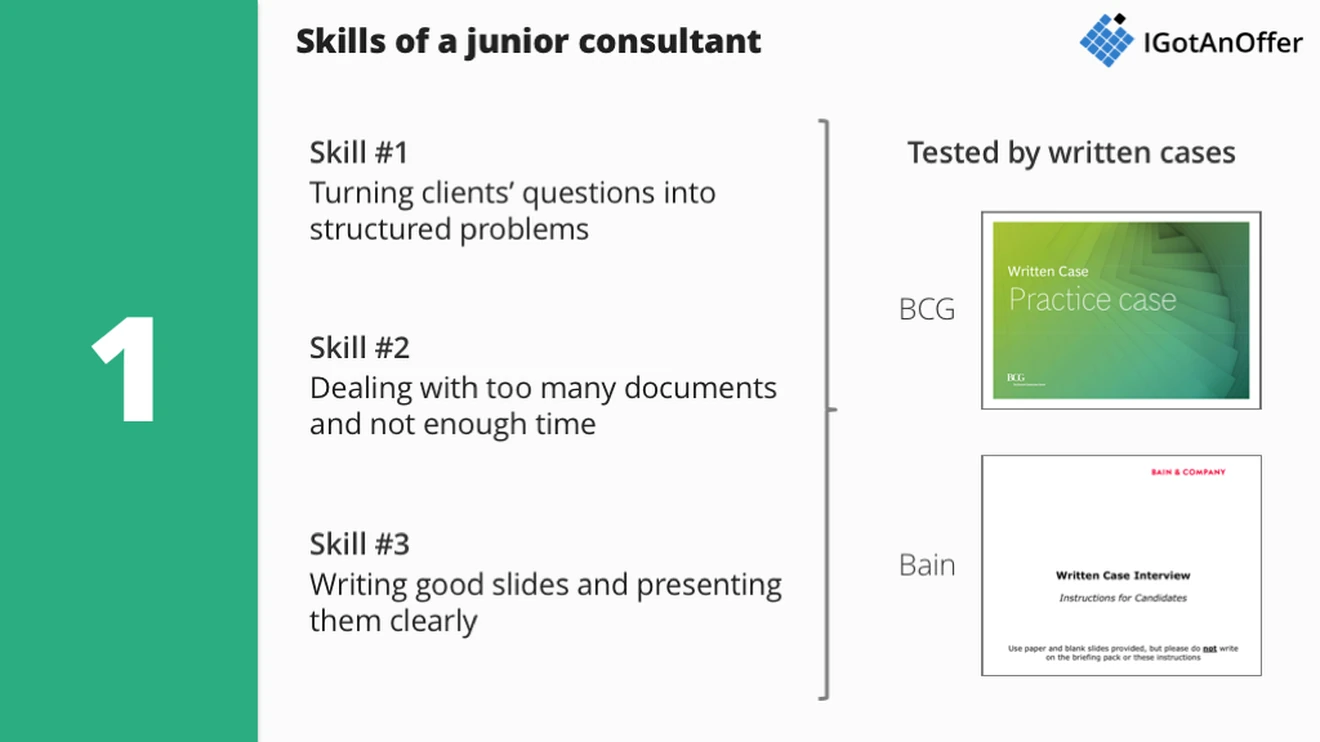
More specifically, Junior consultants spend a lot of time on the following three tasks when they start their career:
- Turning clients' questions into structured problems. At the beginning of your projects, you'll have a series of meetings with your clients to understand the issues they are facing. Your clients will be relatively senior and talk about the issues they are facing at a high level and sometimes in a relatively unstructured way. Part of your role will be to listen and play back the problem the company is facing in a more STRUCTURED way.
- Dealing with too many documents and not enough time. In addition, when you kick start a project you will usually receive a lot of different files from your client (e.g. Excel spreadsheet from the finance team, Power points from the strategy team, etc.) You'll always have too many documents and not enough time to read them. You will therefore have to manage your time very efficiently.
- Writing good slides and presenting them clearly. Finally, once you will have done the analysis to answer your clients' questions you will need to package your results in high quality Power Point presentations. And you will have to present your slides to your clients and convince them that your answer is the correct one.
Not surprisingly, the written cases BCG and Bain use test these three skills. First you will be given a series of questions to answer and will have to structure your approach to be as efficient as possible. Second, you will be given too many documents to analyse and will only have very limited time. And third, you will have to summarise your findings in slides and then present them to your interviewer.
If you do well at written cases it will be a clear indication for the firm that you can do well on one of their projects. These cases closely resemble the situation you will be in when you get hired and BCG and Bain's objective is really to recreate the job's conditions as closely as possible.
BCG and Bain don't systematically use written cases in their recruiting process. So far we've heard people having to take written cases in the countries listed below: US, UK, Russia, etc. In all instances, written cases were part of the second round of interviews, not the first one.
If your country is not on that list, and you would like to confirm if you will have to take the written case, ask your question in the Q&A section below and our team will get back to you with the best information we have got.
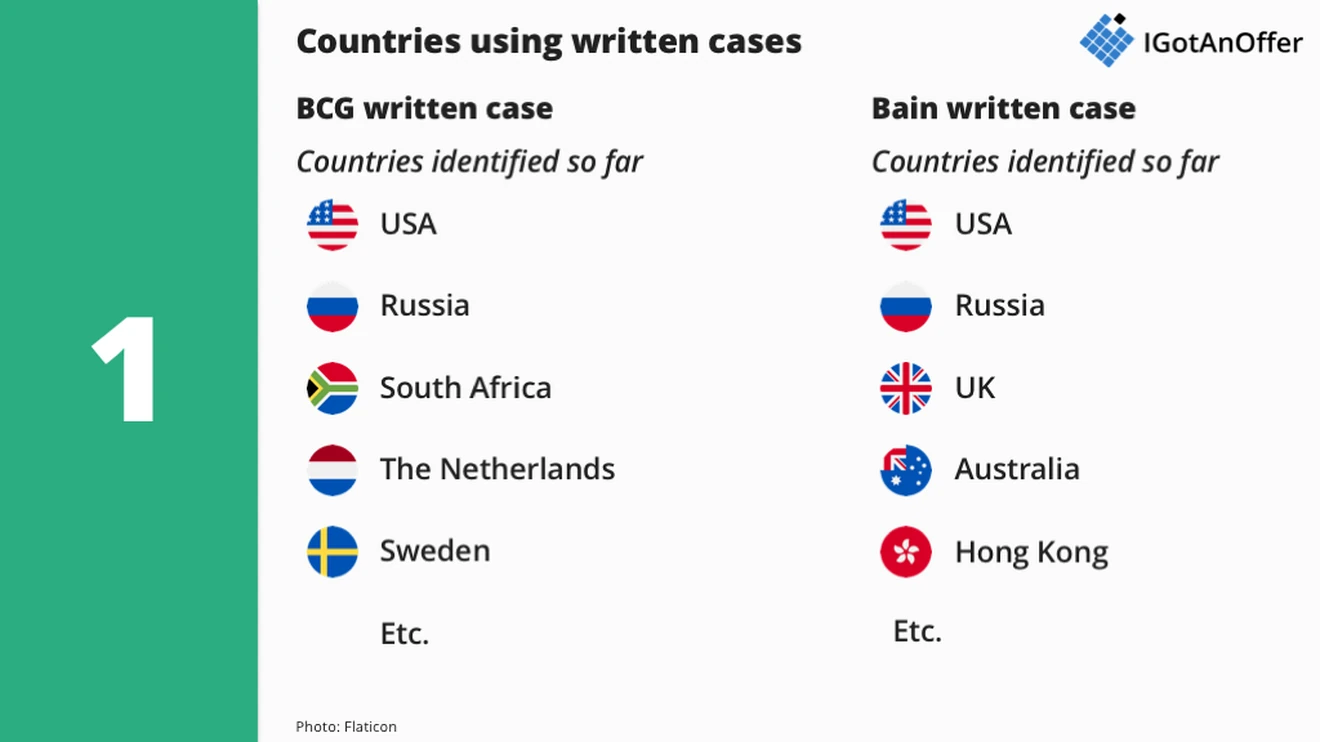
1.2 BCG written case interview characteristics
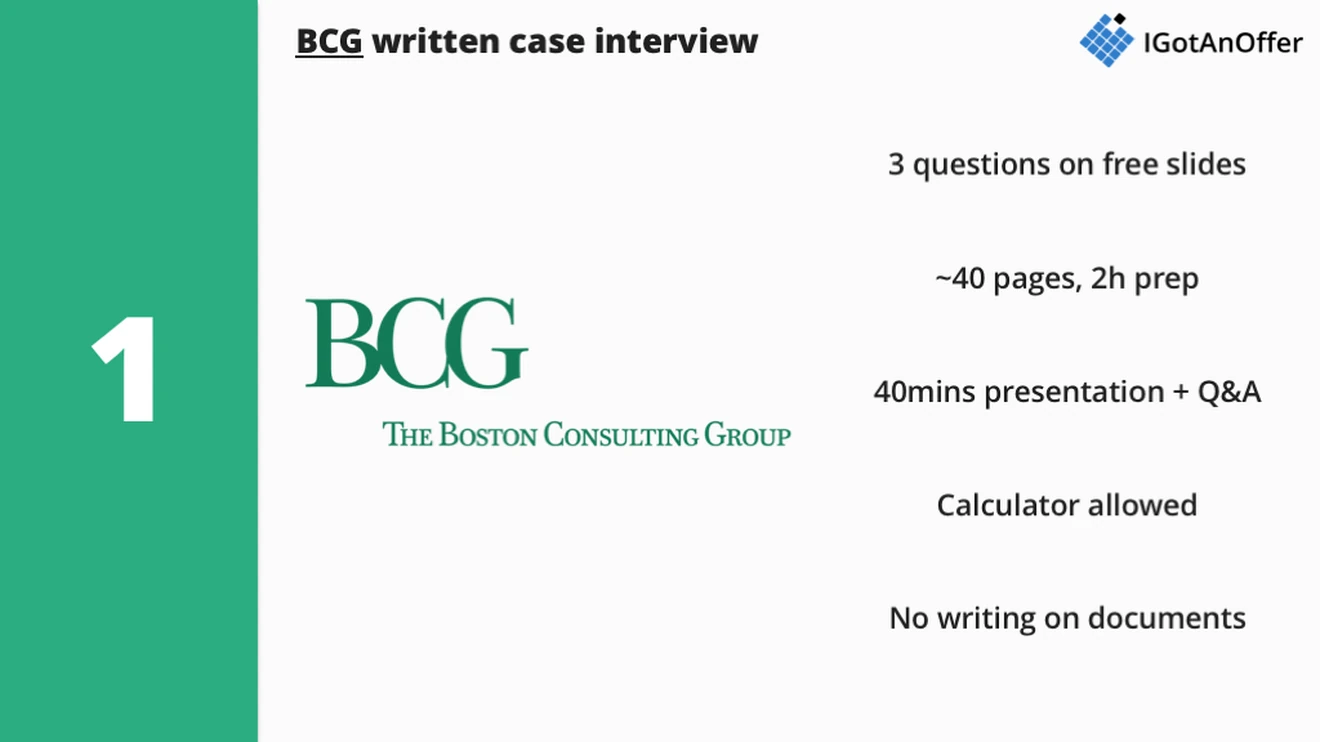
~3 questions on free slides
The first page of a BCG written cases is a printed email from a BCG Partner who asks for your help to put together a few slides for a client presentation. The printed email is actually quite realistic and looks a lot like what you could receive from a Partner on the job.
In the email, the Partner asks you to answer 3 or 4 questions about the client situation in a short presentation of 3 to 5 slides. Here are some examples of the type of questions the Partner could ask:
- "I believe the US should be the client's number one priority. Is this correct? What makes this country so attractive for them?"
- "Which products have the highest chance of being profitable and competitive in the US?"
- "What are the strengths that make Australian wines competitive in the US market vs. their main competitors?"
One important aspect of BCG written cases is that you will need to decide how many slides to write and what to put on them. The slides are completely free. This won't be the case at Bain for instance where you will get more guidance.
~40 pages, 2h prep
In addition to a Partner email, your BCG written case will also typically include ~40 pages of documents. These documents include a mix of tables, graphs and texts from industry and company reports as well as press articles.
Reading through that many documents in 2h is IMPOSSIBLE. The right approach is to look for specific information in these documents that will let you prove / disprove your hypothesis and write the 3 to 5 slides that the Partner has asked for.
The most common mistake candidates make in written cases is to missallocate their time between the different tasks that need to be completed. We will discuss how you can avoid this in more details below.
40mins presentation + Q&A
Once you have written your 3 to 5 slides you will need to present and discuss them with your interview. Interviewers tend to give you ~20mins that to walk them through your slides. And the remaining ~20mins are used for Q&A.
You should be ready for that part of the written case to be very interactive. Your intereviewer will ask you questions and debate some of the points you make. This is normal and will feel a lot like a regular case interview.
Calculators allowed
Finally, one last important point about BCG written cases is that you will be allowed to use a calculator. But you won't be able to take notes on the documents you will be given. This is mainly because BCG reuses the same documents with multiple candidates.
Not being able to take notes on documents actually makes the written case even harder according to past candidates we worked with. It makes it harder to remember where key data points are located and is something you should try to get used to during your preparation.
Note: we also recommend reading the following guide if you are preparing for BCG interviews more broadly.
1.3 Bain written case interview characteristics
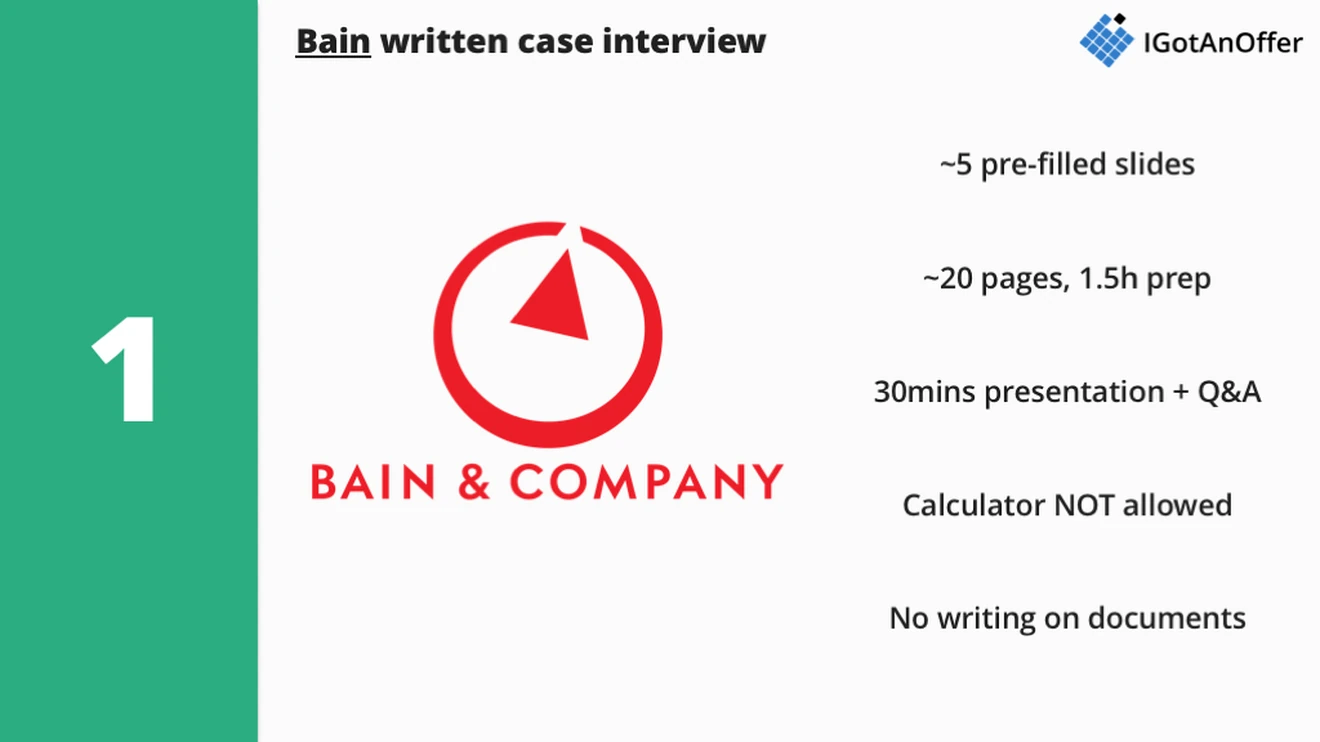
~5 pre-filled slides
In Bain written cases you will get a pack of ~5 pre-filled slides that you will need to complete by doing analysis. Some of the slides will only be pre-filled with a title and you will need to build the whole slide to support that title. Other slides will include graphs and tables that need to be filled with numbers you will calculate.
The fact that the slides are pre-filled means you that, unlike at BCG, you don't have to worry about the overall story for your presentation. You can focus on creating the content that will support the arguments made in the slide titles.
~20 pages, 1.5h prep
You will be given ~20 pages of documents to help you fill your different slides. These documents will include tables, graphs and text from industry and company reports. Only a SUBSET of these documents will be helpful to answer your questions. One of your objectives will be to find those as quickly as possible.
Bain written case interviews include less documents than BCG ones (~20 vs. ~40 pages). But you only have 1.5h to complete the work instead of the 2h you are given at BCG. Overall, the time pressure you will get is therefore quite similar.
30mins presentation + Q&A
Once you have completed the different slides, you will need to present them to an interviewer over a 30mins slot. The first half of the slot will mainly consist in you walking through the slides. And the second half will mainly be a discussion with your interviewer about your conclusions and some of the points you might have missed.
Calculators NOT allowed
Finally, you should note that unlinke at BCG, Bain does NOT allow candidates to use a calculator during written cases. You should therefore expect to have to do a number of calculations mentally to get to the right answer in your written case.
In addition, you will not be allowed to write on the documents Bain will provide you with (apart from the pre-filled slides). As mentioned above, this makes it harder to remember where key pieces of information are located in ~20 pages of documents. It is therefore something you should try to get used to during your preparation.
Part 2: Top 10 tips to crack written cases
Now that you know what to expect in BCG written cases and Bain written cases, let's turn our attention to what you need to do to succeed. We have listed our top tips below to help you become a written cases pro.
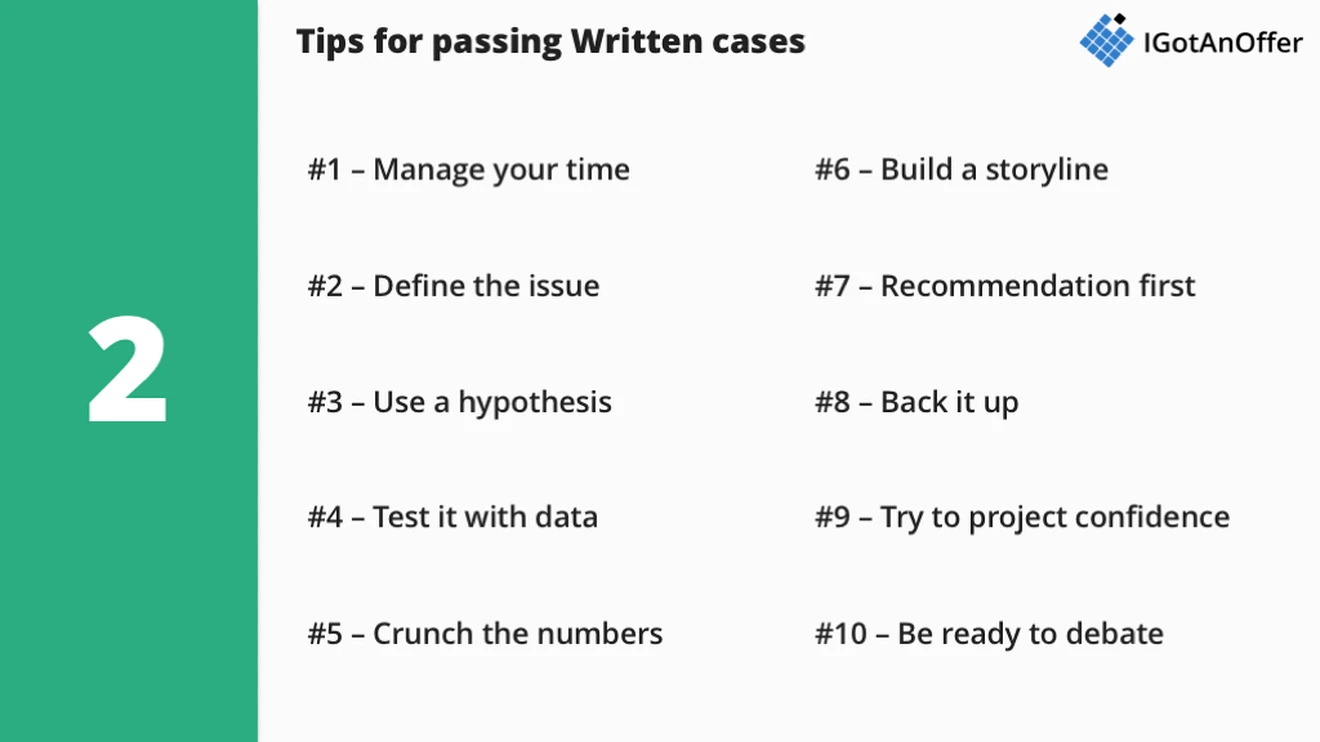
Tip #1 Manage your time
Written case interviews are designed to test your time management skills. As mentioned previously, you will be given TOO MANY documents and will have to QUICKLY the pieces of information that are actually useful. If you don't time-box the different steps of your case (e.g. reading questions, structuring, analysing, writing slides, etc.) you will most likely spend too much time looking at the data. Our recommendation is to use a schedule to work through the case and to stick to it.
Tip #2 Define the issue
If you don't understand the question you are trying to solve correctly you are almost certain to fail the case. Your first job at the beginning of the written case is therefore make sure you are 100% clear with the questions you are trying to answer.
This is what Partners do with senior clients at the beginning of projects. They make sure they perfectly understand the question the client wants their team to answer. This might sound very basic, but misunderstanding your client can be an extremely costly mistake. And you should avoid making that mistake in your written case. There's no point looking at the data until you know EXACTLY what you are looking for.
Tip #3 Use a framework / hypothesis
One of the first things you probably learned at the beginning of your case interview preparation is that you need to use a framework to structure your analysis, and a HYPOTHESIS to explore your framework. Consultants use these approaches on real projects to solve their client’s problem in a STRUCTURED way. One of the benefits of these techniques is that they force you to focus on the problem at hand and end up saving you a lot of time. This is why we strongly recommend that you use them in written case interviews too.
Tip #4 Test it with the data
The biggest mistake you can make in written case interviews is to dive in the large amount of data you have without a specific PURPOSE. Once you have a framework to run your analysis and a hypothesis about the root cause of the problem, you should look for SPECIFIC information in the data to help you prove or disprove your hypothesis. This will enable you to speed-read instead of trying to absorb all the information available in all the documents. It’s a HUGE time saver.
Tip #5 Crunch the numbers
You will very likely have to do a number of calculations to get to the “answer”. If you are trying to calculate the revenue decline rate for a company, it’s very unlikely that the documents will contain exactly that information. It is more likely that one of the exhibits will be the company’s revenues for the past 5 years. And that you’ll have to compute the percentage decline by yourself.
One mistake some candidates make is to forget that they can infer results from the raw data that’s available. In fact, your ability to do this is one the skills that’s being tested in the written case.
Tip #6 Build a storyline
Once you have found the answers to the questions you were asked you need to package that information in a story. This is the first thing you should do BEFORE starting to write any slides.
This is what good consultants do for their client meetings. But make no mistake, the storyline is NOT a summary of the analysis you have done. It is a summary of your FINDINGS and recommendations.
Note that tips #6 and #7 only apply to BCG written cases. In Bain's written cases the slides you will be given will already have titles which makes these points less relevant.
Tip #7 Give your recommendation first
The way you structure your presentation should be exactly like you structure a conclusion in a regular case interview. You should give your recommendation FIRST. If the conclusion of your analysis is that the company should NOT enter the Chinese market, then this is the first thing you need to say. This is because CEOs and clients in general don’t have a lot of time. They want to know your conclusion before knowing how you got to your conclusion. Your overall recommendation should therefore be the first slide of your presentation.
Tip #8 Back it up with supporting arguments
Once you have laid out your conclusion, you then need to support it with with three or more qualitative and quantitative arguments. So the outline of your presentation should feel something like this:
- Slide 1: My recommendation is X. Let me give you 3 reasons to support it
- Slide 2: This is Reason #1, and the charts / data that support it
- Slide 3: This is Reason #2, and the charts / data that support it
- Slide 4: This is Reason #3, and the charts / data that support it
- Slide 5: Let me recap everything I said
Tip #9 Present as confidently as possible
Once you have written all your slides you will then need to present them. The way you do this is important. This is by no means easy but you should try to come across as confident as possible. We’re all stressed when presenting. It’s ok to be stressed and it’s ok to not be very confident. But you should try to not let that be too visible to your interviewer. Make eye contact with them and walk them through your presentation as calmly and surely as you can.
Tip #10 Be ready to debate
Most of the time, there’s no single right answer in strategy projects. There are different ways of looking at the situation and of solving the problem at hand. It’s the same thing in written cases. As a consequence, you should be ready to debate your recommendations with your interviewer.
They’ll likely agree on some of the points you made. But they’ll also challenge some of your conclusions and introduce new ideas you hadn’t thought of to test how you react. You should not be surprised by this behaviour.
Part 3: Written case interview preparation plan
What's the best way to prepare for your written case interview? And how do you make sure you succeed? In our experience the following 3-step approach makes for a great preparation.
- First, develop fast maths and reading skills
- Second, learn to write presentations like a consultant
- Third, practice written case interviews
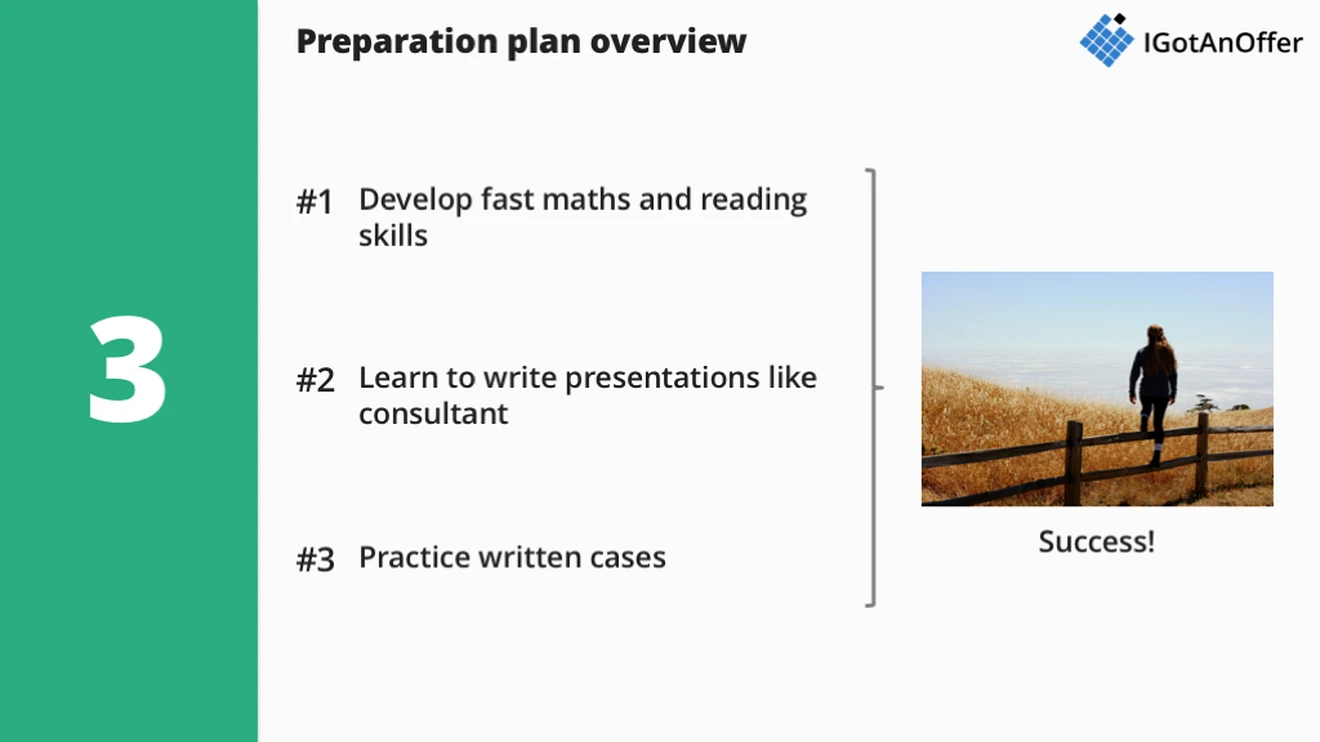
3.1 Develop fast maths and reading skills
The first thing you should do if you have not already done so is to take the free written cases made available by BCG and Bain (you can download them at the top of this page). When you do these cases you will probably realise that doing calculations efficiently and finding information quickly plays a HUGE part in completing the case on time.
Fortunately, these skills can be trained. If you are preparing for consulting interviews you are probably already working on improving your mental maths speed. You should continue doing this as it will also be helpful for written cases.
In addition, we also recommend investing some time thinking about how you can minimise the time you spend looking for information in the different documents you will be given. In our experience, focusing on the following two aspects brings the best results:
- First, as we mentioned in the tips section, you should browse the documents with SPECIFIC objective. Every time you look at the documents you should actually be looking for a precise piece of information. This approach will guarantee that you are not wasting time.
- Second, some of the candidates we work with also invest time in improving their intrinsic reading speed - i.e. the number of words they can read per minute. If you are interested in this topic you can read this article. If you don't have enough time to invest in this area, focusing on graph and table titles will actually go a long way in helping you identify the exhibits you need.
3.2 Learn to write presentations like a consultant
Once you are familiar with the BCG and Bain written cases format and have brushed up your maths and reading skills you need to improve your slide writing technique. Consultants write a LOT of slides. And there are some rules they follow to write them.
Here are the top 3 high-level rules you should be aware of:
- First, your slide title should be concise and conclusive. "Nestle's 2017 revenue were down 5%" is a poor slide title because it is not conclusive. It's only informational. A good slide title would be: "Nestle's 2017 revenue were down 5%, mainly driven by market share loss in Asia." This is a good slide title because it identifies the problem AND its root-cause.
- Second, all your slide titles should read like a story when put together. Here's an example: "Nestle's 2017 revenue were down 5%, mainly driven by market share loss in Asia. The launch of 3 new Unilever products in China was the biggest driver of market share loss in Asia. We estimate we can regain our market share within the next 18 months by decreasing prices and launching 4 new products lines. Etc." Each of these sentences should be a slide title summarising the story for your interviewer.
- Third, the content of each slide should SUPPORT its title by displaying data that helps you make your point. For instance, for the first slide we discussed above you could split your slide into two halves. Left-hand side: a chart showing Nestle's revenues decline year by year and highlighting the 5% decrease. Right-hand side: a chart showing the market share loss is in Asia.
You can train putting slides together in many different ways. One approach we suggest is to download a few reports written by BCG and Bain that you are interested it. These reports are usually 10+ pages long. We encourage you to summarise them in 3 to 5 slides using the tips above. A lot of these reports are also in Power Point format so you will both familiarise yourself with how consultancies write slides, and you will get used to writing your own.
3.3 Practice written cases
Finally, the last step of your preparation should be to practice on written cases. The difficult thing about this step is that there aren't many written cases available on the Internet.
The best alternative we have found so far are MBA case studies. They are very similar to actual written cases: they include a business situation with texts, graphs and tables.
When you do them, we would encourage you to treat them like regular written cases. You should identify the 3 or 4 questions you want to answer about the case using the guidelines provided. And you should then give yourself 1.5 to 2h to answer these questions in slide format. After you have done this you should train to walk someone through your slides orally.
The more your train in real conditions, the better you will perform on the day. In our experience successful candidates are really rigorous about this. And we encourage you to follow their example.
Most business schools charge for access to their case studies. But MIT makes a number of case studies available for free here. If you find other helpful MBA case studies available for free post them in the comment section below and we will add them to this article.
How to prepare for consulting interviews
We've coached more than 15,000 people for interviews since 2018. There are essentially three activities you can do to practise case interviews. Here’s what we've learned about each of them.
Practise by yourself
Learning by yourself is an essential first step. We recommend you make full use of the free prep resources on our consulting blog and also watch some mock case interviews on our YouTube channel. That way you can see what an excellent answer looks like.
Once you’re in command of the subject matter, you’ll want to practice answering cases. But by yourself, you can’t simulate thinking on your feet or the pressure of performing in front of a stranger. Plus, there are no unexpected follow-up questions and no feedback.
That’s why many candidates try to practice with friends or peers.
Practise with peers
If you have friends or peers who can do mock interviews with you, that's an option worth trying. It’s free, but be warned, you may come up against the following problems:
- It’s hard to know if the feedback you get is accurate
- They’re unlikely to have insider knowledge of interviews at your target company
- On peer platforms, people often waste your time by not showing up
For those reasons, many candidates skip peer mock interviews and go straight to mock interviews with an expert.
Practise with experienced MBB interviewers
In our experience, practising real interviews with experts who can give you company-specific feedback makes a huge difference.
Find a consulting interview coach so you can:
- Test yourself under real interview conditions
- Get accurate feedback from a real expert
- Build your confidence
- Get company-specific insights
- Learn how to tell the right stories, better.
- Save time by focusing your preparation
Landing a job at a top consulting company often results in a $50,000 per year or more increase in total compensation. In our experience, three or four coaching sessions worth ~$500 will make a significant difference in your ability to land the job. That’s an ROI of 100x!
Click here to book a mock case interview coach with an experienced MBB interviewer.






